|
Friday, september 1'st
Leaving Buzios at 8.30 for
Rio de Janeiro. Same
minibus, same driver and same company - only myself. But this time it's day and
dry, so you can actually see where you are going. A lot of poor farmland, and as
we get closer to Rio, it's more industrial-areas and favellas.
|
We arrive at
Rio Othon
Olinda at 11.30. I say goodbye to the driver, and checks in at room 205. Othon Olinda is a bit old and rundown - just the place I like - and it's right
on Copacabana. I spend the day
walking Copacabana. First all the way up this famous beach - and then plans are
to walk all the way down. But as I pass my hotel it starts to rain, so I get
inside for a football match on the TV instead.
There's not many
people on Copacabana on a day like this - the locals find it too cold. 22
degrees celsius is not a decent weather for beach-life. So there's only a few
football players, and the usual guys selling fake football-shirts.
|
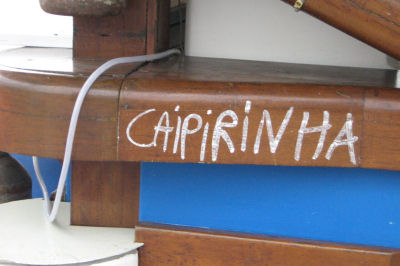 |
|
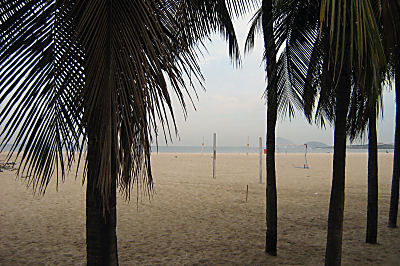 |
Dinner at a
local Charuscoria. Plenty of red meat and good salad. You pay 3 reails for 100
grams.
The day ends in
the hotel bar with a view across the road to Copacabana. Well actually a view
towards the gas-station in the middle of the road.
|
|
Saturday, september 2'nd
First duty is a
local ATM. 350 Reials for the the last few days.
350 Reials is by
the way the minumum-wage for a month here in Brazil. Christina tells about that
on my first tour of the day - a
favela-tour. So
I spend the same amount of money on a few days as a tourist as a lot of people
is making in a month. Something to think about.
A large part of
the inhabitants of Rio is living in favelas placed up the hills. Favelas has got
a reputation for being dangerous. Police has nothing to do here. The local
drug-dealers are controlling these areas. But Christina tells us that we can be
safe. They know we are here as tourists, and the moral-codecs of the favella is
that crime is not allowed inside the favella. That will only attract the police,
and noone is interested in that.
|
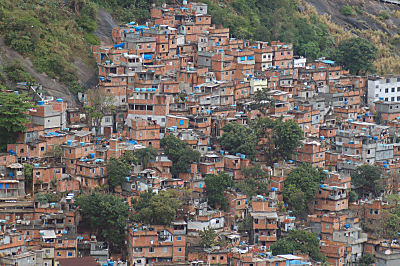 |
|
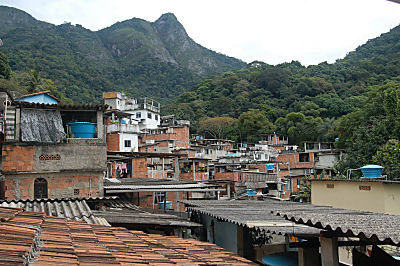 |
It's ok to take
pictures, but not of people wearing guns or walkie-talkies. They are involved in drugdealing, and would not be happy to see their faces on
www.henningn.dk. Favelas is also known from
the great film "City of Gods"
The first favela
is called Rocinha and it's huge. No one really knows how many people live here,
but estimated - on the use of electricity - it's somewhere between 100.000 and
150.000 people. We make 3 stops in Rocinha. One just as we get into the favella,
one a a building with a nice view across the favela and the last one in a busy
shopping-street. A favela is like a whole community. You don't have to get
outside. You can buy everything you need in the favela.
|
|
The architecture
of a favala is something speciel. Houses are build of what you can get. Rocinha
is a relatively "wealthy" favela, so most houses are made of decent materials,
but here and there you also see blue plastic used as part of the construction.
Many houses are
in more floors. They build one floor, and when that's not enough they put
another one on top - etc. etc. There's no earthquakes in Brazil, so it seems to
be an ok method.
Electricity is
something special as well. Cables are everywhere, hanging across the streets. In
this area most houses has water and sewers as well - and most even
satellite-dishes. According to Christina no one in Brazil can live without
football and soap-operas on the TV.
|
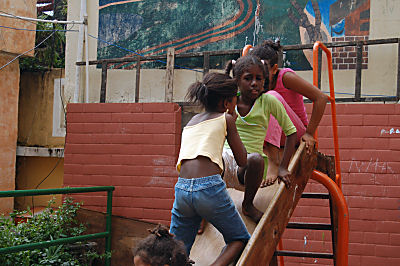 |
|
Second tour of
the day is for Maracana - one of the largest football-stadiums in the world. It
was built for the world cup in 1950, and they promised to paint it, in the
colours of the champions - believing that it would be Brazil. But it wasn't, so
the stadium is painted lightblue - the colours of Uruguay.
The match
tonight is between Flamengo
and
Internacional.
One of the best clubs in Rio vs. the winner of Copa Libertadores (Champions
league of South America). Only a crowd of 14.000, but they make a lot of noise. Flamengo gets in front at the end of the 1'st half, but the game is turned
upside down as Internacional scores on two penalties in the second half. The
crowd is not at alle happy with the home team - especially the left back who was
the guilty one for the second penalty is having a hard time with the crowd.
|
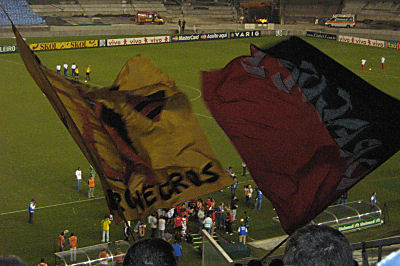 |
|
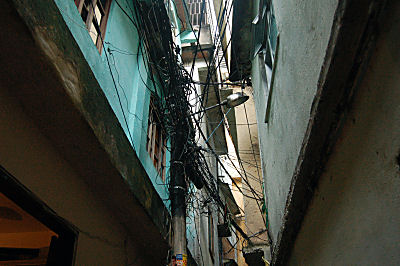 |
Next favela is
much smaller. It's called Villa Canoas. We visit a community-school - called
Para Ti - where they try
to help the kids that is dependent on the hopeless public schools. Half of the
price of this tour, is for supporting this school.
Then we walk the
tiny alleys of this favela. If the guide wasn't there we would get lost.
The whole trip
takes 3 hours - some of the most well spent 3 hours on any tour I have ever
taken.
The match ends
at 8 and we return to the hotel.
|
Sunday, September 8'th
|
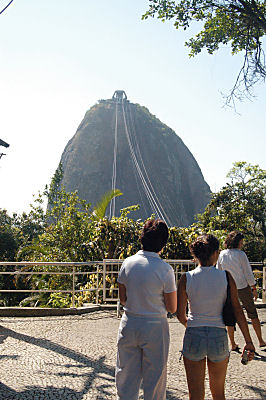 |
The big Rio-tour
today. Guide is picking me up at 9 for a trip to the major Rio sights. First one
is
Sugar Leaf
- or Pao de Acucar in the local language.
It takes 2 rides
on a aerial ropeway to get to the mountain with the great views. Weather is
perfect, so you can see all the Rio neighbourhoods clustered among the green
hills in one of the most beautiful cities in the world.
Sugar Leaf is
app. 400 m. hight, and is also a good destination for rock-climbers. There are
several groups climbing up and down the hills this morning.
|
|
A couple of
small aeroplanes is in the air above writing the letters Oi in their stream. Oi
is a telephone-company sponsoring the Rio Marathon that takes place today.
From Sugar Loaf
we cross the city to the beaches of Ipanema and Leblon. It's nice weather, so
there are people at the beaches today.
And then it's
time for lunch.
|
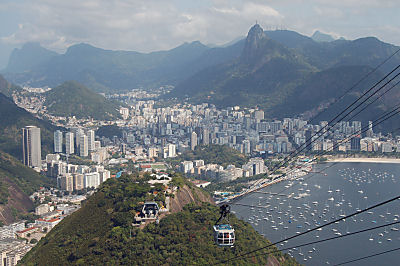 |
|
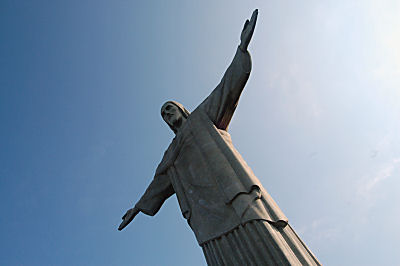 |
Afternoon starts
with a drive through the huge Tijuana-forest to the mountain of
Corcovado. This place
is famous for the huge christ-figure - called Christ the Redeemer. We are 710 m.
up in the air, so it's pretty cold. We get to see the statue, and the nice view
before we get on the bus again. Now we go down through the charming - but also
dangerous area of Santa Theresa. We pass the house where Ronnie Biggs - famous english train-robber - spent his life, before going back to England and prison
in 2001. Later we also pass Maracana and the Sambadrome, where the carnival in
February takes place. Now it's just a huge place made out of concrete. Some
samba-dancers would have been nice.
|
|
Last
stop is the San Sebastian Cathedral. Very modern thing. Ugly from the
outside, but pretty nice inside.
Then on
via Rio downtown and the 2 neighbourhoods of Botafogo and Flamengo to
the hotels at Ipanema and Copacabana. As usual I end up being the last
one on the bus, so I have to spend an hour looking at different hotel
where the other people on the bus is staying.
Dinner
at my local and a short walk up Copacabana. There's a huge concert-thing
going on - lot's of people - impossible to get past them.
|
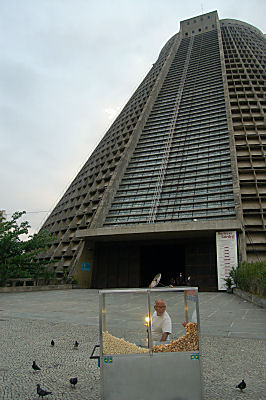 |
Monday, september 4'th
Rain in Rio. Not
so nice. The only thing I can think of is going to the shopping mall Rio Sul.
That's not what you travel half the world to see is it?.
Dinner at a
local restaurant recommended by Lonely Planet. "Manuel e Joaquim" it's called -
and it's great.
Tuesday, september 5'th
|
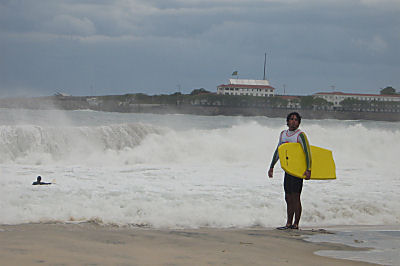 |
Windy and cloudy
today - but no rain. Not exactly how Rio looks in the tourist-brochures, but at
least you can take a walk outside. I go for a long walk along Copacabana and Ipanema. No one is swimming at the beaches, but the weather is great for
surfing. There are huge waves. A lot of people use this chance, and they are
good at it.
|
| My last brazilian
lunch is at "Manuel e Joaquim". I'm only been in Rio for 3½ day, and
that's not enough - especially when you miss a day due to rain. There's
a lot of things I haven't seen - but maybe some other time.
|
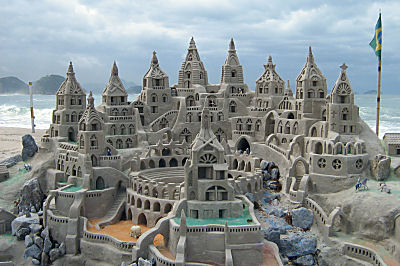 |
|
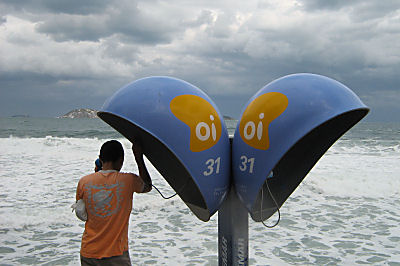 |
Taxi from the hotel
at 2.30 to Rio Airport. TAP leaves at 5.30 and we land in Lisbon at 7.15 wednesday morning local time after a 9 hour long flight, with bad movies
and no sleep.
|
Wednesday, september 6'th
TAP leaves
Lisbon again at 9.30 and arrives in Copenhagen 3½ hour later at 2.10 - local
time. I grab my luggage, and reach the train to Vejle at 2.40 - arriving at my
hometown at 5.20.
To
frontpage
|